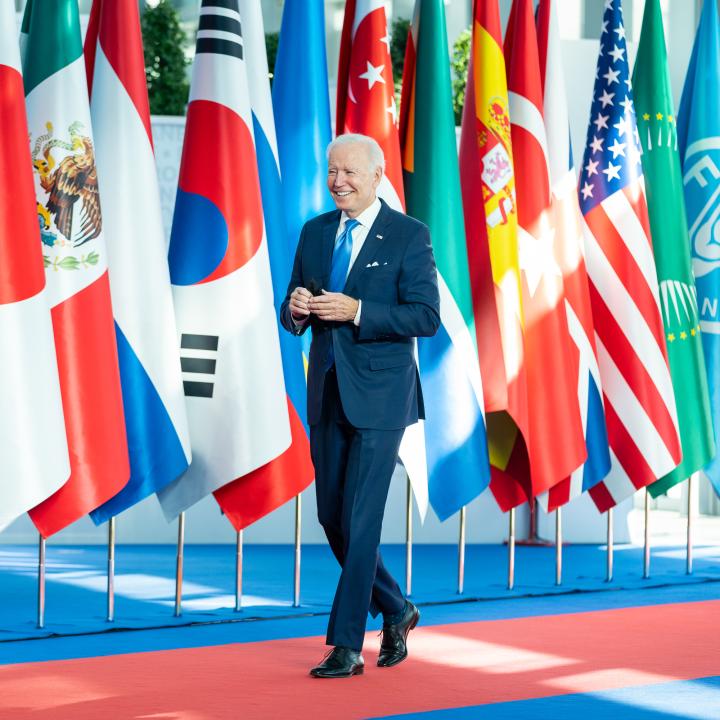
- Policy Analysis
- Policy Alert
Coordinated Iran Sanctions Require Coordinated Enforcement

Following the attack on Israel, world leaders seek to build a coalition of the willing to hold Tehran accountable for its malign activities—though sanctions won’t have their intended effect unless partners cooperate on robust enforcement as well.
Much like the coordinated air defense that successfully countered most of Iran’s massive attack on Israel last weekend, the first salvo of international actions against Tehran came in the form of coordinated sanctions, with more such measures to follow. These sanctions focus on Iran’s drone and ballistic missile programs, among other military targets. Yet more significant than the specific entities listed is the effort to build a coalition of like-minded states with the will to take coordinated action against Iran, acting through and alongside multilateral organizations such as the G7 and United Nations. That alone sends a clear message to Tehran—though it will not be truly impactful unless it leads to coordinated sanctions enforcement as well.
What Was Designated
Britain and the United States issued parallel sanctions announcements, with the former describing the actions as a “coordinated package” and the latter as a “concurrent” action. Their stated purpose is “to tighten the net on key actors within Iran’s unmanned aerial vehicle (UAV) and missile industries and further limit Iran’s ability to destabilise the region.”
Britain designated seven people and six entities for facilitating “Iran’s destabilizing activity in the Middle East, including its direct attack on Israel.” The designees included the Armed Forces General Staff, the Islamic Revolutionary Guard Corps (IRGC) Navy, and the Khatam al-Anbia Central Headquarters. All but two of the entities were already designated by the United States: the Aseman Pishraneh Engineering Services Company and the drone industry firm Mahtabal.
The U.S. announcement targeted sixteen people and two entities tied to the drone program, along with five foreign companies that provide component materials for Iranian steel production. The latter companies are located around the world—in Britain, Germany, Hong Kong, Turkey, and the United Arab Emirates. Washington also used counterterrorism authorities to target several companies in the Iranian auto industry for supporting the IRGC. Alongside these Treasury Department actions, the Commerce Department’s Bureau of Industry and Security issued new controls restricting Iran’s access to specific technologies (e.g., basic commercial-grade microelectronics).
Coalition of the Willing
The most significant aspect of the designations is the effort to present them as the first step in a coordinated multinational effort. Treasury Secretary Janet Yellen stated, “Today, in coordination with the United Kingdom and in consultation with partners and allies, we are taking swift and decisive action to respond to Iran’s unprecedented attack on Israel,” adding that more actions were coming soon. Similarly, Foreign Secretary David Cameron stated, “The sanctions announced today alongside the US demonstrate our unequivocal condemnation of Iran’s attack on a sovereign state.”
Notably, the designations were announced during a G7 foreign ministers meeting in Italy. The leaders of the intergovernmental organization jointly stated that they “unequivocally condemn in the strongest terms Iran’s direct and unprecedented attack against Israel”; they also committed to working together “to stabilize the situation and avoid further escalation.” And in a subsequent statement, they noted, “We will hold the Iranian government accountable for its malicious and destabilizing actions, and we stand ready to adopt further sanctions or take other measures, now and in response to further destabilizing initiatives.” G7 finance ministers and central bank governors likewise condemned the attack, pledging to “ensure close coordination of any future measure to diminish Iran’s ability to acquire, produce, or transfer weapons to support destabilizing regional activities.”
At the UN, a group of forty-eight member states issued a joint press statement condemning the attack and implicitly pointing to coordinated sanctions: “We welcome the efforts to avert a further immediate escalation of violence in the region, following the successful coordinated efforts to defend against Iran’s attack.” This statement is laudable, but unfortunately it had to be issued alongside a UN Security Council meeting rather than as a formal UNSC statement or resolution. China and Russia have supported Tehran even after the attack and will presumably continue blocking UNSC sanctions resolutions. Accordingly, international measures targeting Iran will have to be broadly supported and well-coordinated to be effective.
The Need for Coordinated Enforcement
Although joint sanctions send a strong message to Tehran regarding international unity against its malign activities, these measures will not have their intended effect unless enforcement is robust and fully coordinated as well. To illustrate: Iranian oil exports recently hit a six-year high despite existing sanctions, averaging 1.56 million barrels per day in the first three months of this year, nearly all of which went to China. This reportedly amounts to around $35 billion per year in additional revenue for Tehran. Similarly, current sanctions have not prevented German exports to Iran from growing by 22 percent, reaching 241 million euros in the first two months of 2024.
The new designations also highlight how Iran frequently circumvents sanctions by using cutouts to procure materials via third countries. As noted above, companies based in Dubai, Dusseldorf, Hong Kong, Istanbul, and London were among those designated for providing parts and materials to Iran’s steel industry. Yet even more than adding new entities to designation lists, enforcing existing sanctions is the most effective way to target Iran’s malign activities.
Matthew Levitt is the Fromer-Wexler Senior Fellow at The Washington Institute and director of its Reinhard Program on Counterterrorism and Intelligence. Previously, he served as deputy assistant secretary for intelligence and analysis at the Treasury Department.



